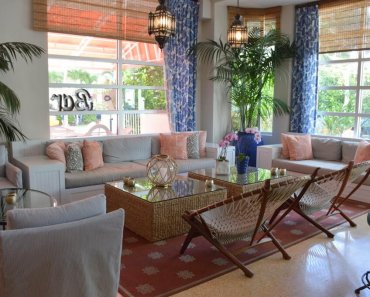Here at the Ein Gev Fish Restaurant, you order the specialty of the house–the St. Peter’s Fish–and suddenly, you are eating fish from the same sea where Jesus and his disciples fished over 2,000 years ago. So in a sense, says Yoel, our kibbutz tour guide who was born here in 1948, you’re eating a descendant of Jesus’ fish that fed the masses.
Can this be real? Can any of this spectacular world–the kibbutz, the glistening sea in the backdrop, the fried fish with its eyeball peering at me from my plate, the sweetened lemonade on our table, the other four journalists and bloggers I’m with, Israel itself–be real?
I’ll say this about the Ein Gev Holiday Resort: that’s exactly how everything feels here. From the small boats lapping against the shoreline waiting for the kibbutz’ fishermen to set up shop for the day, to the flocks of cormorant birds landing on the pier, to the man who owns the kibbutz’ toy store unlocking the front door to his workshop, this little resort on the Sea of Galilee, owned and operated by its members, is one of the most special places I’ve ever had the opportunity to stay.

Ein Gev is literally situated on the shores of the Sea of Galilee near the base of the Golan Heights. Not only is it renowned for the almost 150,000 fish it serves travelers and boaters each year in its Fish Restaurant, but, even though small by some hotel standards, is one of the largest facilities for guests in the entire region. It is also entirely run by the kibbutz itself, from the receptionist at the front lobby to the chef cooking the fish in the restaurant’s kitchen.
If you’re not familiar with kibbutz culture, the entire philosophy basically boils down to what the word actually means: “communal settlement.” In Israel, they began in the early 1900s as predominantly rural societies, groups of farmers working together for the good of the entire community’s food growing and preparation. As the 20th century wore on, though, kibbutz culture became attractive to those who were committed to equality, social justice, and a sharing of resources, profits, and living spaces–especially for Jews who had comes from places like Eastern Europe and wanted to reconnect with their homeland and to flee the palpable tensions between Jews and Arabs during the Arab Revolt in Palestine. These pioneers devised fortified settlement projects–many of which were built overnight as defensive posts–and later developed into longer-term, sustainable agricultural communities.
The Ein Gev kibbutz, which was founded in 1937 by settlers hailing from countries as diverse as Czechoslovakia, Germany, Austria, and the Baltic countries, was one of these settlements. It has been at its lakeside spot for nearly 70 years, having moved there after getting too big to be sustainable at its original location. Today, it has grown to nearly 220 members who have a mix of livelihoods: farming, hotel management, teaching, business operations, and fishing.

- Get a Car Rental
- Search for Great Tours HERE
- Buy Travel Insurance


We arrived at the kibbutz in the late afternoon and ate our St. Peter fish (less glamorously known as tilapia) in the restaurant by the sea, watching the sun dip into the blue horizon and the kibbutz members close up for the night. Lights went off; buildings closed; families went back to their homes for the evenings; and we, newly arrived, made our way to our private rooms.


Though there are 166 hotel-style rooms, there are are plenty of standalone rooms at Ein Gev. In fact, there are 96 family units and 70 rooms for two–all individual units with their own front doors, patios, and personal gardens. They’re perfect for solo travelers who like some room to stretch their legs, couples who are looking for roomy privacy, and families who don’t mind sleeping on the extra beds in the spare room. Most rooms overlook the lake, which is spectacular by both day and night, and amenities are relatively standard: smart TV, espresso machine, little snacks for late-night munchies, and a comfortably-sized bathtub and sitting area. The decor is minimal, drawing on the idea that most people come to a kibbutz to enjoy some solitude and not be bombarded with fancy photographs or art pieces, bold colors, or large patterns. Everything in the rooms is, well, simple, clean, and organized.
Though our stay at the kibbutz was short–just one quick night–our tour of the entire kibbutz in the morning gave me some excellent context for how the resort fits into the rest of the lifestyle and pace of the kibbutz.


What I learned about kibbutz life, I’ll save for another story. But the resort? Most definitely worth a stay. Just like the rest of Israel, a country I’m still struggling to understand, a country I can’t stop thinking about, Ein Gev, too, is worth remembering.
—
At the time of this review, rates are starting at around $212 USD/night for a double room. You can book online or email the reservations team at resort@eingev.org.il. Note: Those who book online automatically receive a 7% discount at time of purchase. Or you can compare rates and book through Expedia, Hotels.com or Booking.com.
Article and photos by Kristin Winet.
Most gracious thanks to Weill and the Israel Ministry of Tourism for hosting our stay during this trip.





